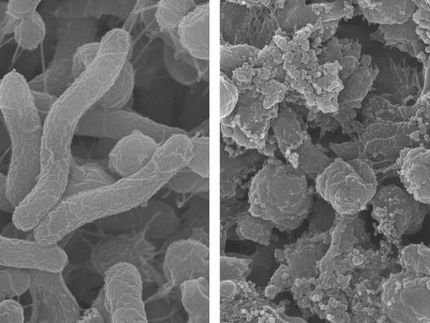Notre Dame chemists discover new class of antibiotics
Advertisement
A team of University of Notre Dame researchers led by Mayland Chang and Shahriar Mobashery have discovered a new class of antibiotics to fight bacteria such as methicillin-resistant Staphylococcus aureus (MRSA) and other drug-resistant bacteria that threaten public health. Their research is published in the Journal of the American Chemical Society in an article titled "Discovery of a New Class of Non-beta-lactam inhibitors of Penicillin-Binding Proteins with Gram-Positive Antibacterial Activity."
The new class, called oxadiazoles, was discovered in silico (by computer) screening and has shown promise in the treatment of MRSA in mouse models of infection. Researchers who screened 1.2 million compounds found that the oxadiazole inhibits a penicillin-binding protein, PBP2a, and the biosynthesis of the cell wall that enables MRSA to resist other drugs. The oxadiazoles are also effective when taken orally. This is an important feature as there is only one marketed antibiotic for MRSA that can be taken orally.
MRSA has become a global public-health problem since the 1960s because of its resistance to antibiotics. In the United States alone, 278,000 people are hospitalized and 19,000 die each year from infections caused by MRSA. Only three drugs currently are effective treatments, and resistance to each of those drugs already exists.
The researchers have been seeking a solution to MRSA for years. "Professor Mobashery has been working on the mechanisms of resistance in MRSA for a very long time," Chang said. "As we understand what the mechanisms are, we can devise strategies to develop compounds against MRSA."
"Mayland Chang and Shahriar Mobashery's discovery of a class of compounds that combat drug resistant bacteria such as MRSA could save thousands of lives around the world. We are grateful for their leadership and persistence in fighting drug resistance," said Greg Crawford, dean of the College of Science at the University of Notre Dame.
Most read news
Other news from the department science

Get the life science industry in your inbox
By submitting this form you agree that LUMITOS AG will send you the newsletter(s) selected above by email. Your data will not be passed on to third parties. Your data will be stored and processed in accordance with our data protection regulations. LUMITOS may contact you by email for the purpose of advertising or market and opinion surveys. You can revoke your consent at any time without giving reasons to LUMITOS AG, Ernst-Augustin-Str. 2, 12489 Berlin, Germany or by e-mail at revoke@lumitos.com with effect for the future. In addition, each email contains a link to unsubscribe from the corresponding newsletter.





















































